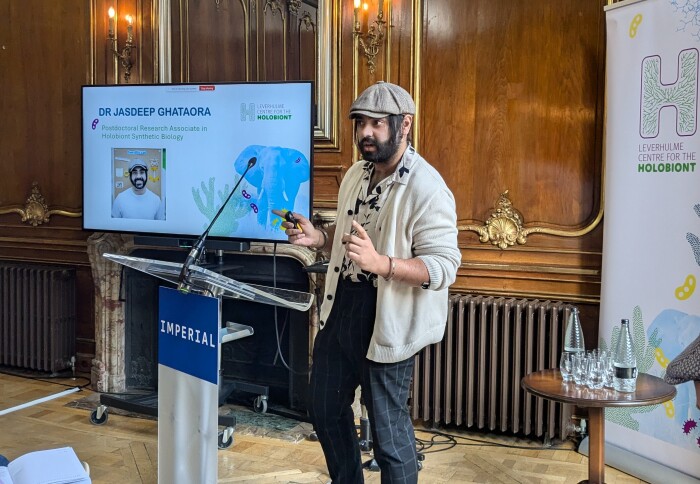Reaching a tipping point in holobiont research
by Jacklin Kwan

Researchers across bioengineering, medicine and life science showcased the newest developments in ‘holobiont’ research.
The holobiont captures complex interactions between microscopic life and their hosts.
This year’s annual meeting for the Leverhulme Centre for the Holobiont, hosted at Imperial College London, gathered researchers from across the Faculties of Engineering, Medicine and Natural Sciences, as well as partner stakeholders.
Microbes interact with all living organisms in intricate, and sometimes unexpected, ways Professor Tom Bell Director of the Leverhulme Centre for the Holobiont
“Microbes interact with all living organisms in intricate, and sometimes unexpected, ways,” said Professor Tom Bell from the Department of Life Sciences and Director of the Centre.
“Our annual meeting today showed that we had made some key advances across many areas, from understanding how microbes interact with frogs on their skin to how the bacteria in bee guts are impacted by pesticides,” he said.
Engineering new windows into hidden worlds
Talks led by researchers from the Department of Bioengineering explored how engineering principles can help scientists manipulate and study complex microbe-host systems effectively.

The improvement of tools like CRISPR may even allow researchers to genetically engineer biosensors into organisms like bees and frogs, so we can use their natural biomes to measure their exposure to environmental pollutants or stressors.
On-a-chip technologies also allow researchers to replicate and study microbial interactions within a controlled, artificial microenvironment, providing a clearer view of the microbial dynamics at play.
One example, developed by PhD student Louis Cohen from the Department of Bioengineering, allows scientists to capture the real-time development of growing fungi threads – known as mycelia – in response to different stressors.
We are trying to bring and develop new technologies that can help us better understand what is going on in holobionts Professor Tom Ellis Department of Bioengineering
"We are trying to bring and develop new technologies that can help us better understand what is going on in holobionts, which are quite difficult due to being so much more used to sterile conditions and monocultures," explained Professor Tom Ellis, from the Department of Bioengineering.
Uncovering the role of microbes and fungi in animal systems
Since the start of the decade, research interest in the role of the ‘microbiomes’ on health, disease and ecological balances in the wider environment has exploded. Studies from Imperial have highlighted their role in influencing cardiovascular health, as well as in beneficial adaptations food crops and animals.
Researchers from the Department of Life Sciences presented new research on how the symbiotic partnership between fungi, microbes and their larger host systems – like toads or bark beetles – can influence overall health and survival.

Alice Day, a PhD student from the Department of Life Sciences, also presented initial results that showed how microbial soil communities are essential for crop yield. “I’m hoping to use this knowledge to inform the restoration of agricultural land,” she said.
“In the future, I expect we will increasingly use this knowledge to alter some of these ‘holobiont’ relationships,” said Professor Tom Bell.
“This might result, for example, in being able to inoculate host organisms with specific microbes as probiotics. We are already working on whether we can improve crops using bacteria that help plants grow better without needing fertilisers or pesticides,” he said.
Article supporters
Article text (excluding photos or graphics) © Imperial College London.
Photos and graphics subject to third party copyright used with permission or © Imperial College London.
Reporter
Jacklin Kwan
Faculty of Natural Sciences